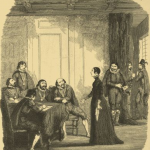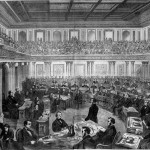On June 21, 1788. New Hampshire was the ninth state to ratify the United States Constitution. Pursuant to the Constitution’s Article VII New Hampshire’s ratification put the Constitution officially in effect. Although New Hampshire ratified, the delegates to its ratification convention clearly had reservations. The ratification message included a dozen suggestions for constitutional amendments pursuant to Article […]
The Fourteenth Amendment’s Privileges OR Immunities Clause
The Supreme Court deserves the respect it earns. When it fails to enforce the Constitution as it was written its credibility is strained. Regarding the Fourteenth Amendment’s Privileges or Immunities Clause, it has been wrong for nearly 150 years. The Bill of Rights was ratified in 1791 in response to complaints that the original Constitution […]
The Fifth Amendment’s Due Process Clause, Descendant of the Magna Carta
“No freemen shall be taken or imprisoned or disseised or exiled or in any way destroyed, nor will we go upon him nor send upon him, except by the lawful judgment of his peers or by the law of the land.” Magna Carta, Chapter 39, June 15, 1215 June 15, 2015 marks the 800th Anniversary […]
The Sixth Amendment’s Right to Confront Witnesses
Sir Walter Raleigh of the late 1500’s is known for a number of things. He was a great explorer[1] of the New World, both North and South America. He is either credited or cursed for promoting tobacco in England. He is cited as an example of the consummate gentleman for putting his cloak on a […]
Sixth Amendment Right to Be Informed of Criminal Charges
It certainly seems obvious and fair that when the government charges someone with a crime that the person be told what law he has violated and what he did to violate that law. That a government does not always conduct itself in a fair manner and that it needs to be reminded of the obvious […]
Sixth Amendment’s Right to a Jury in Criminal Cases
The list of colonial grievances against King George in the Declaration of Independence included: “For depriving us in many cases, of the benefits of Trial by Jury: … He has abdicated Government here…” In Article III, the unamended Constitution provided for jury trials in criminal cases[1] as follows: “The Trial of all Crimes, except in Cases […]
Sixth Amendment’s Public Trial: From Communal Duty to Accused’s Right
The Constitution’s Bill of Rights contains many procedural protections for those the government accuses of having committed a crime. Among them is the Sixth Amendment right to a “public trial”. The provision is stated: “In all criminal prosecutions, the accused shall enjoy the right to a… public trial” The concept of a public trial is ancient, but it did […]
Sixth Amendment’s Speedy Trial Right: Ancient, Worthy and Elusive
The Constitution’s Bill of Rights contains many protections for those the government accuses of having committed a crime. Among them is the Sixth Amendment right to a “speedy trial”. The provision is stated: “In all criminal prosecutions, the accused shall enjoy the right to a speedy … trial” The right may has old roots and […]
The Sixth Amendment’s Right to the Assistance of Counsel
Thanks to television police reading the Miranda Warnings people are familiar with a criminal defendant’s right to an attorney and that an indigent defendant may have appointed counsel. Such protections have not always been part of United States law. The right to an attorney is found in the Constitution’s Sixth Amendment. The Sixth Amendment was ratified as part of the Bill […]
Fourth Amendment Probable Cause for a Warrantless Arrest
A police officer cannot arrest a citizen without a warrant based upon a hunch or mere suspicion. He must have “probable cause”. The US Constitution‘s Fourth Amendment[1] requires a warrant for a person or his property to be “seized” or searched by a government agent. The law has developed allowing government agents to conduct warrantless […]














